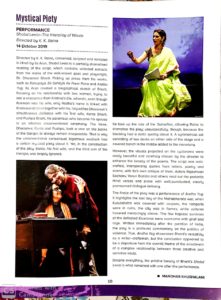Dharamvir Bharati’s Play: Andha Yug
Playwright: Dharmavir Bharati
Translation: Sukesh Panda
Director: Chavan Pramod R.
Group: Department of Dramatics, M.S. University, Vadodara
Language: Gujarati
Duration: 1 hr 30 mins
The Play
Prologue: The prevailing fight between power and survival in the world, the wrath of the blind age.
Act 1: Dhrutarashtra and Gandhari crying for their dying sons and eagerly waiting for Sanjay. The Vrudhha Yachak enters with his predictions.
Act 2: Ashwatthama transforms himself into a destructive being and tries to kill Sanjay and Vrudhha Yachak, Krutvarma and Krupacharya question Ashwatthama’s intentions.
Act 3: Yuyutsu enters Hastinapur after winning battle with Pandvas, and Gandhari dishonours him. Ashwatthama justifies his intentions, and Krutvarma and Krupacharya join his struggle.
Interlude: The Vruddha Yachak explains Andha Yug and the characters give a description of their world.
Act 4: Vidur and Sanjay narrate the details of Ashwatthama’s cruelty to Gandhari. Ashwatthama releases Brahmastra. Sanjay leads Gandhari to the corpse of Duryodhan. Gandhari blames Krishna and curses him.
Epilogue: Question – “How to save humanity?”
Director’s Note
This piece of work focuses solely on the thematic content of the play, rather than abiding by the conventional structure. It attempts to look beyond the barriers of time and space and emerges subtly and symbolically. The questions raised are regarding human tolerance and the atrocities of war, where women, children and youth are the major victims. “When will the world be peaceful?” is the quintessential quest. I have attempted to depict my perceptions about how various systems drive a region and its inhabitants into insoluble problems of restless society and political turmoil, where the sole sufferers are the common people.
The Director
A recipient of Sangeet Natak Akademi Ustad Bismillah Khan National Award for Theatre Direction, Dr. Chavan Pramod R. is a disciple of Guru Kavalam N. Panikkar, under whose guidance he pursued training of Natyashastra and Sanskrit Theatre. He also underwent the basic training of Kutiyattam at Kalamandalam and worked in-depth on different forms of Kerala. Dr. Chavan Pramod has done Ph.D., Masters and Bachelors in Theatre with 4 gold medals from the Dramatics Department, M. S. University of Baroda. Some of the plays designed and directed by him are Andhayug, Uttararmcharitam, Venisamhara, Ashadh Ka Ek Din, Waiting for Godot, Vikramorvashiyam’s fourth Act, Dak Ghar, Juloos, Hayavadan etc. His book Rang Saptak – An Anthology of Panikkar’s Plays Translated in Hindi has been published by Rajkamal Prakashan.
The Playwright
Dharmavir Bharati was a renowned Hindi poet, author, playwright and a social thinker of India. He was the chief editor of the popular magazine Dharmayug. Bharati was awarded the Padmashri for literature in 1972 and Sangeet Natak Akademy Award in playwriting in 1988. Prominent works by him include Gunahon ka Devta, Suraj ka Satwan Ghoda, Andha Yug etc.
The Group
Department of Dramatics, The Maharaja Sayajirao University of Baroda has nurtured a number of aspiring artists wanting to pursue theatre as profession. Along with the academic experience it also creates a platform for art events, festivals, workshops, seminars and research. It has started “Satur Theatre” to inculcate performance skills in the students and orient audiences for the Theatre Movement. It has been conducting the Manch Parva – National Theatre Festival since 2011.
Cast & Credits
Gandhari 1 Mallika Lokhande
Gandhari 2 Riya Doshi
Gandhari 3 Vaidesha Lobiyal
Dhrutarashtra Shashank Jha
Ashwathama Bhavesh Thakarel
Yuyutsu Priyank Gangwani
Sanjay Saket Chouhan
VruddhaYachak/
Western Dance Prashanjit Dey
Vidura Mohammad Nawaz Khan
Krutvarma /Western Dance Akhil Nair
Krupacharya Hardik Soni
Prahari 1 Nirav Popat
Prahari 2 /Fashion Show Himadri Vyas
Vyasa/Fashion Show Ivan MD Khan
Chorus 1/Western Dance/
Fashion Show Parth Nair
Chorus 2 Sanket Chouhan
Garba Dance Nupur Thaker, Shweta Jain
Music Composer
& Vocal Vipul Barot
Music Composer
& Instrument Manish Barot
Music Arranger Birju Kanthariya
Music Operator Sanket Chouhan / Riken Chokshi
Light Design Rishikesh Karanjgaokar
Make-up Gaurav Chaturvedi
Playwright Dharmvir Bharati
Director Chavan Pramod R.
Contacts
Dr. Chavan Pramod R.
Director, Department of Dramatics
Faculty of Performing Arts
The Maharaja Sayajirao University of Baroda
Opp. Sursagar, Nyay-Mandir, Gujarat
Vadodara- 390001
M: +91 9898822624
E: chavan_pramoduma@yahoo.co.in
chavan.pramod-dramatics@msubaroda.ac.in
